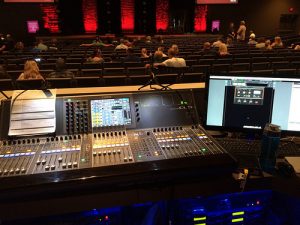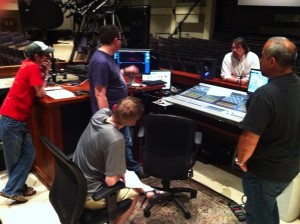
Speeding Past Adaptation
I was hoping to get one of the longer articles I’ve been working on out this week, but that doesn’t seem like it’s going to happen. So instead I offer something to ponder.
One of the keys I’ve found to getting a great mix is speed. Difficulty in achieving a great mix seems to rise the longer it takes to put a mix together. I’ve heard other pro’s say the same kind of thing so what’s going on here?
I think one of the challenges to mixing is that our ears have a tendency to adapt to what they’re hearing. In other words, a lot of times when we listen to something long enough, at some point our brains accept it as “correct”. This can be troublesome as a mixer because through this process we lose our perspective.
Maybe you’ve had an experience like this. You’re mixing away at a mid-week rehearsal or a Saturday night service. You think everything is golden but when you come in on Sunday morning, everything sounds completely different from how you remember it.
I think that’s an adaptation problem. Your ears adapted to what they heard on the first night, but now that you’re fresh you’re hearing things as they actually are.
So what do you do about this?
One of the ways I combat this is I work fast, but part of why I can do that is because I’ve been behind a console for over 25 years now. My mind processes what I hear very quickly these days, and I mix almost intuitively. This is a lot harder to do, though, for many of the part-time and volunteer engineers I’ve been teaching in workshops, though. So I’ve been thinking about this a lot to try and figure out ways to work past our adapting ears.
Where I notice adaptation the most is in relation to tonality. So I think one key is to take care of tonal issues first. Is something muddy? Is it clear? Is it too bright? Can you understand what’s being said? Is there some strange resonance or ring in the sound? Fix that stuff first.
Lately, when I’ve been mixing in new environments I often have each instrument play a bit for me so I can set the level as well as check the overall tonality and make any adjustments necessary via mic placement and/or choice along with EQ. With vocal mics, I might even pre-dial the microphone. I might do this by talking into the mic and making some adjustments. In some cases if there’s a recording rig, I may even record a snippet of me checking the mic and play it back at FOH so I can adjust things without hearing myself as I’m talking; if I use my voice for monitors, though, I never use a recording.
I think another way to combat adaptability is by taking breaks. This is a lot easier to do if you’re in a studio environment, but there are ways it can be done in a live environment as well. If you have an assistant or a trainee, letting them take over can give you a quick bit of downtime to step out of the venue and rest your ears a bit. During a long rehearsal, the band might also be ready for a break, and you might get some points with them for suggesting one.
Sometimes during the break, it can be a good idea to reset your ears by listening to something else. When I’m mixing in the studio, I use reference tracks to make sure my ears aren’t getting weird, and I’m on the right track. I haven’t found a good way to employ reference tracks live, yet, but maybe you can figure it out and let us know in the comments below.
Another thing I think helps goes back to the title of this article: speed. Take things one at a time and work as fast as you can. Make decisions quickly. Don’t overthink things. Learn to trust your gut and act on it.
I work fast at getting a preliminary mix up, but that doesn’t mean I don’t put in a good chunk of time on a mix. In fact, most of my time is probably spent refining and polishing things.
When breaks and speed fail, my RTA running next to me is another helper. While most of the time I might be using it to verify problems with the mix, it can also be used to verify problems with my own ears.
So how do you get past the adaptation of your hearing and keep your ears fresh while mixing? I’d love to hear your methods and ideas in the comments.


 Previous Post
Previous Post Next Post
Next Post





